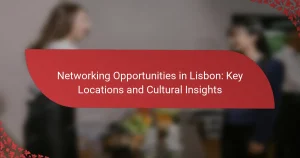Navigating cultural etiquette in Lisbon is essential for successful business interactions. Key aspects include understanding respect, formality, and the importance of personal relationships. Punctuality is valued, yet meetings may start late, and small talk is crucial for rapport. Familiarity with local customs and dining etiquette enhances communication and fosters positive connections.
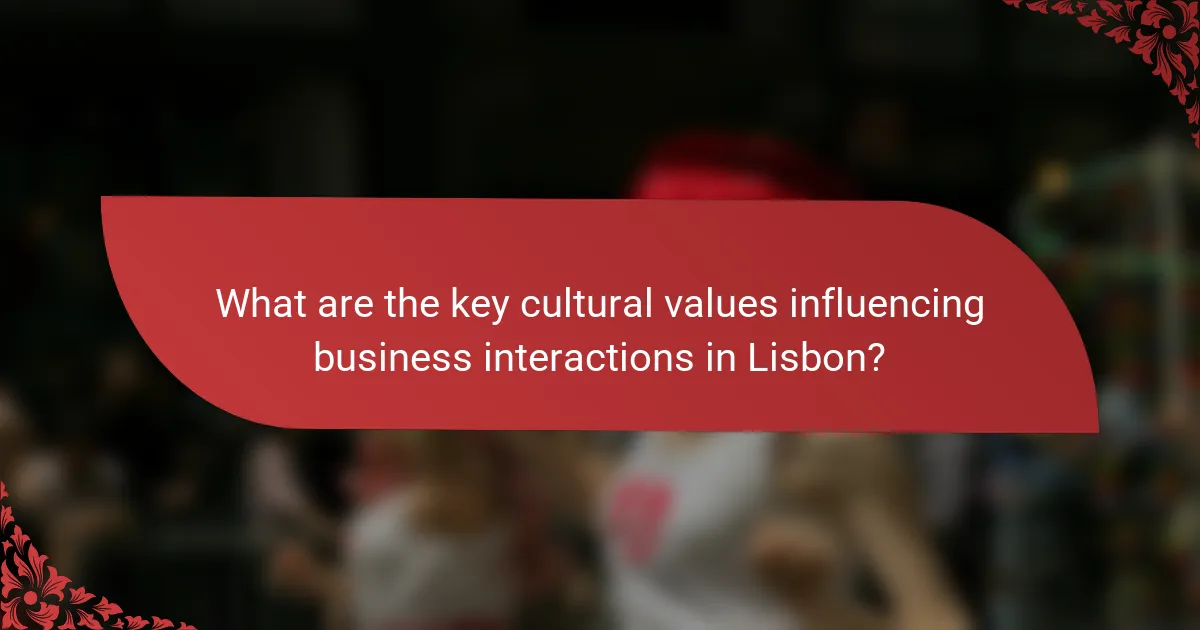
What are the key cultural values influencing business interactions in Lisbon?
Key cultural values influencing business interactions in Lisbon include respect, formality, and personal relationships. Portuguese culture emphasizes building trust and rapport before engaging in business transactions.
Understanding the importance of hierarchy is crucial; seniority often dictates decision-making processes. Punctuality is valued, but meetings may not always start on time.
Moreover, personal connections play a significant role; small talk and discussions about family or local culture are common. This approach fosters a friendly atmosphere, enhancing collaboration and mutual understanding.
Lastly, demonstrating appreciation for Portuguese customs and history can strengthen professional ties, leading to successful business outcomes.
How does personal relationship building impact business success?
Building personal relationships significantly enhances business success in Lisbon. Strong connections foster trust, improve communication, and create opportunities for collaboration. Understanding cultural etiquette is vital; for instance, greetings often involve a handshake and maintaining eye contact. Additionally, showing respect for local customs, such as punctuality and dining etiquette, can lead to more fruitful interactions. Engaging in casual conversations about local culture can also strengthen bonds, making business dealings smoother and more effective.
Why is punctuality important in Portuguese business culture?
Punctuality is crucial in Portuguese business culture as it reflects respect and professionalism. Arriving on time fosters trust and demonstrates commitment to the partnership. In Lisbon, being late can be seen as a lack of seriousness, potentially damaging relationships. Therefore, respecting time is essential for successful business interactions.
What role does hierarchy play in workplace dynamics?
Hierarchy significantly influences workplace dynamics by establishing clear roles and responsibilities. In Lisbon’s business culture, understanding this hierarchy is crucial for effective communication and collaboration. Respect for authority reflects traditional values, impacting decision-making processes. Adapting to these dynamics fosters positive relationships and enhances business outcomes.
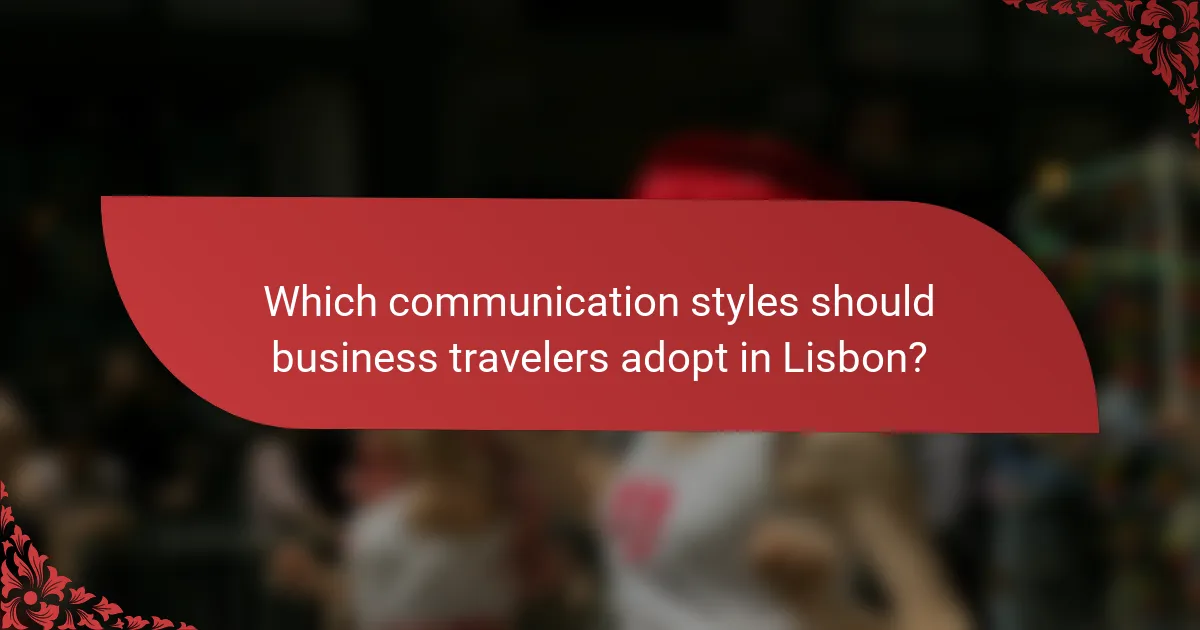
Which communication styles should business travelers adopt in Lisbon?
Business travelers in Lisbon should adopt a respectful and direct communication style. Emphasizing politeness, maintaining eye contact, and using formal greetings are essential. Portuguese culture values personal relationships, so engaging in small talk can build rapport. Understanding local customs, such as addressing individuals by their titles, enhances communication effectiveness.
How do non-verbal cues affect business negotiations?
Non-verbal cues significantly influence business negotiations by conveying trust and respect. In Lisbon, understanding these cues can enhance communication. For instance, maintaining eye contact demonstrates confidence, while gestures can emphasize points. Additionally, personal space is crucial; standing too close may be perceived as intrusive. Adapting to these cultural nuances fosters positive relationships and effective negotiations.
What are the common phrases and greetings to use in professional settings?
Common phrases and greetings in professional settings in Lisbon include “Bom dia” for good morning, “Boa tarde” for good afternoon, and “Boa noite” for good evening. “Como está?” is a polite way to ask how someone is, while “Prazer em conhecê-lo” means “Nice to meet you.” Using these phrases demonstrates respect for local culture and enhances business interactions.

What dining etiquette should be observed during business meals?
During business meals in Lisbon, observe formal dining etiquette. Arrive on time, greet everyone, and wait for the host to start. Use utensils properly, keeping your hands above the table but elbows off. Engage in polite conversation, avoiding controversial topics. Respect local customs, such as trying all dishes served. Always thank the host at the end of the meal.
How does the Portuguese dining culture differ from North American and British practices?
Portuguese dining culture emphasizes social interaction and lengthy meals, contrasting with the quicker dining practices in North America and Britain. Meals in Portugal often last several hours, fostering conversation and connection. Table etiquette includes sharing dishes and enjoying multiple courses, which differs from the more individualistic approach seen in North America and Britain. Additionally, dinner typically starts later in Portugal, around 8 or 9 PM, reflecting a more relaxed pace of life. Understanding these cultural nuances can enhance business interactions in Lisbon.
What are the expectations regarding toasting and drinking during meals?
In Lisbon, toasting and drinking during meals is expected and culturally significant. Participants typically raise their glasses and make eye contact while saying “Saúde,” meaning “health.” This practice enhances camaraderie and respect among diners. It is common to toast before starting a meal and during special moments, like celebrating achievements. Additionally, sharing a drink signifies hospitality, making it an essential aspect of dining etiquette in business settings.
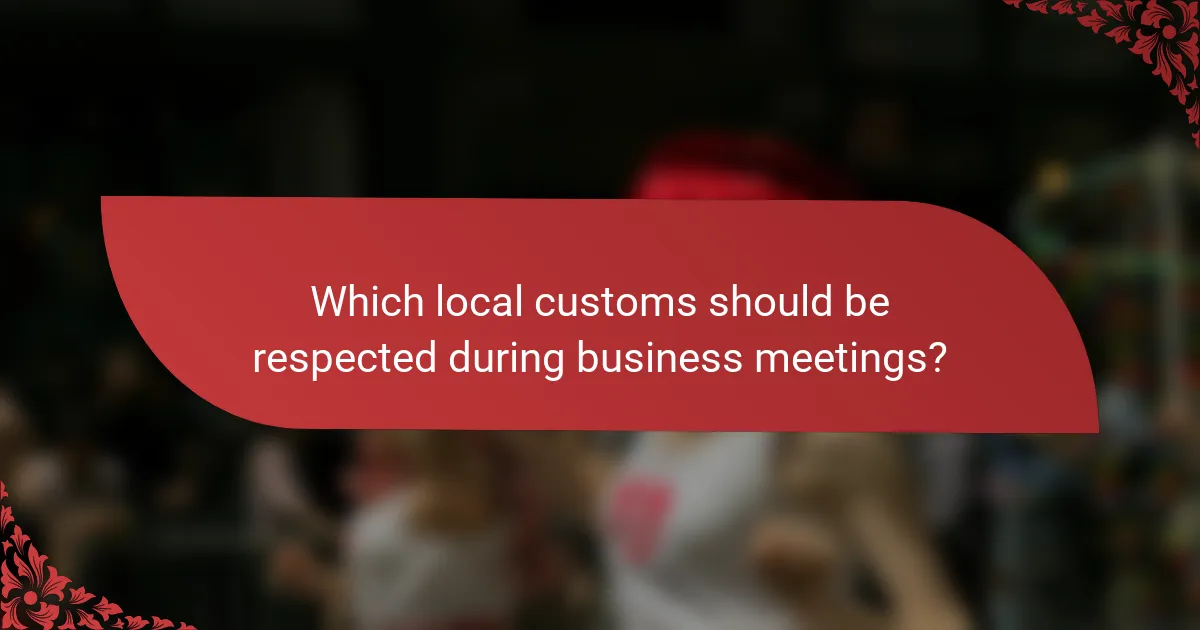
Which local customs should be respected during business meetings?
Respecting local customs during business meetings in Lisbon is essential for successful interactions. Key customs include greeting with a firm handshake, maintaining eye contact, and using formal titles initially.
Punctuality is valued, but a slight delay is generally acceptable. Meetings often begin with small talk, emphasizing relationship building. Dress codes tend to be formal, reflecting professionalism.
Understanding these customs fosters positive business relationships and enhances communication effectiveness.
How should gifts be presented to Portuguese business partners?
Gifts should be presented to Portuguese business partners with care and thoughtfulness. Use high-quality items that reflect appreciation, such as local specialties or branded products. Presentation matters; wrap gifts elegantly and avoid overly extravagant displays.
What is the significance of dress code in professional settings?
Dress code in professional settings is significant as it conveys respect, professionalism, and cultural awareness. In Lisbon, adhering to local dress norms enhances business relationships and reflects positively on your organization. Formal attire is generally preferred, with attention to neatness and quality. Understanding these expectations fosters trust and facilitates smoother interactions in a diverse business environment.
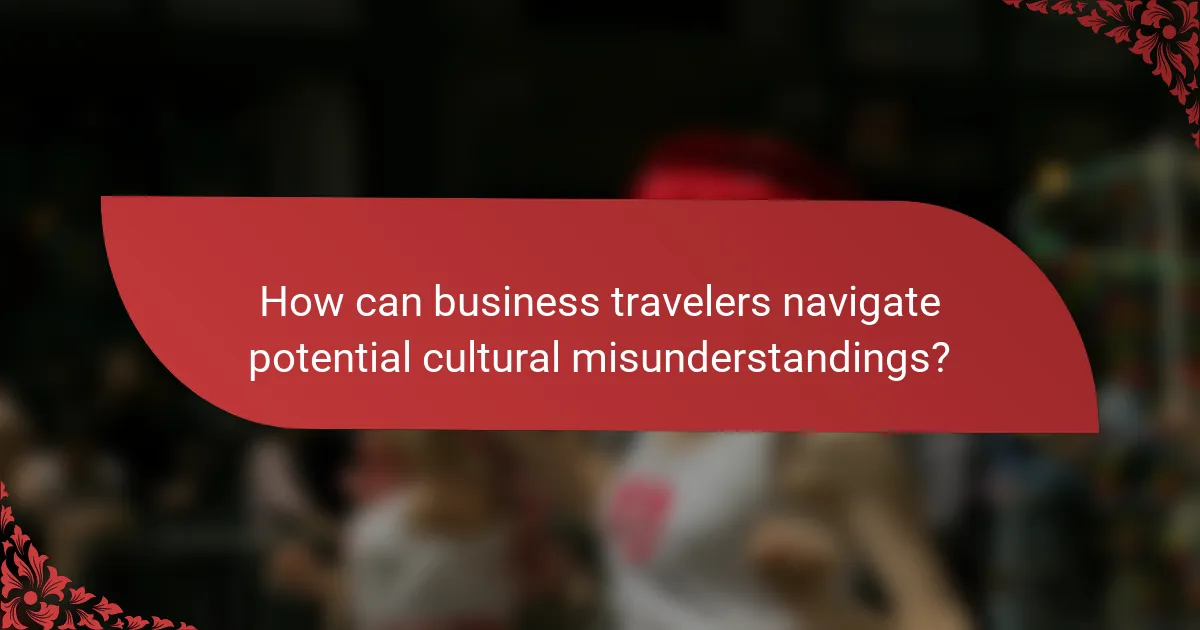
How can business travelers navigate potential cultural misunderstandings?
Business travelers can navigate potential cultural misunderstandings in Lisbon by researching local customs and practicing patience. Understanding Portuguese communication styles is essential; they value politeness and formality in business settings.
Knowing key phrases in Portuguese can enhance interactions and show respect. For instance, greetings like “Bom dia” (Good morning) and “Obrigado” (Thank you) are appreciated. Additionally, being aware of dining etiquette, such as waiting for the host to start eating, fosters goodwill.
Building relationships is crucial in Portuguese business culture. Engaging in small talk before discussing business matters can establish trust. Finally, being open to feedback and adapting to local practices can help avoid misinterpretations.
What are common faux pas to avoid in Portuguese culture?
In Portuguese culture, common faux pas include being overly direct, arriving late, and discussing personal finances. Understanding these nuances enhances business interactions.
1. Avoid discussing politics or religion, as these topics can lead to discomfort.
2. Do not interrupt while someone is speaking; it is considered disrespectful.
3. Refrain from using first names until invited; formality is valued.
4. Do not assume everyone speaks English; learning basic Portuguese phrases is appreciated.
5. Avoid tipping excessively; rounding up the bill is usually sufficient.
How can one address and resolve conflicts effectively?
To address and resolve conflicts effectively, practice active listening and maintain cultural sensitivity. Acknowledge differing perspectives and seek common ground. In Lisbon, understanding local customs can enhance communication and foster collaboration. Respectful dialogue is key to navigating disagreements.
What resources are available for understanding Lisbon’s business etiquette?
To understand Lisbon’s business etiquette, several resources are available. Business travelers can consult local guides, etiquette books, and online articles that focus on Portuguese culture. Networking with local professionals can provide firsthand insights. Additionally, attending workshops or seminars on cultural norms can enhance understanding. Local chambers of commerce often offer resources and events tailored for international business interactions.
Which local organizations offer cultural training for business travelers?
Local organizations offering cultural training for business travelers in Lisbon include the Lisbon Chamber of Commerce, Instituto Camões, and the Portuguese Institute for Quality. These organizations provide workshops and resources to enhance understanding of local customs and business practices.
What are the best online platforms for learning about Portuguese business customs?
The best online platforms for learning about Portuguese business customs include Coursera, LinkedIn Learning, and Udemy. These platforms offer courses that cover essential cultural etiquette and business practices in Lisbon. Coursera provides university-level courses, while LinkedIn Learning focuses on professional development. Udemy features a wide range of user-generated content, allowing for diverse learning styles. Engaging with these resources enhances understanding of local customs, improving business interactions in Portugal.
What practical tips can enhance cross-cultural communication in Lisbon?
To enhance cross-cultural communication in Lisbon, understand local customs, respect personal space, and engage in polite greetings. Acknowledge the importance of face-to-face interactions and be aware of non-verbal cues. Use clear language and avoid slang to ensure comprehension.

